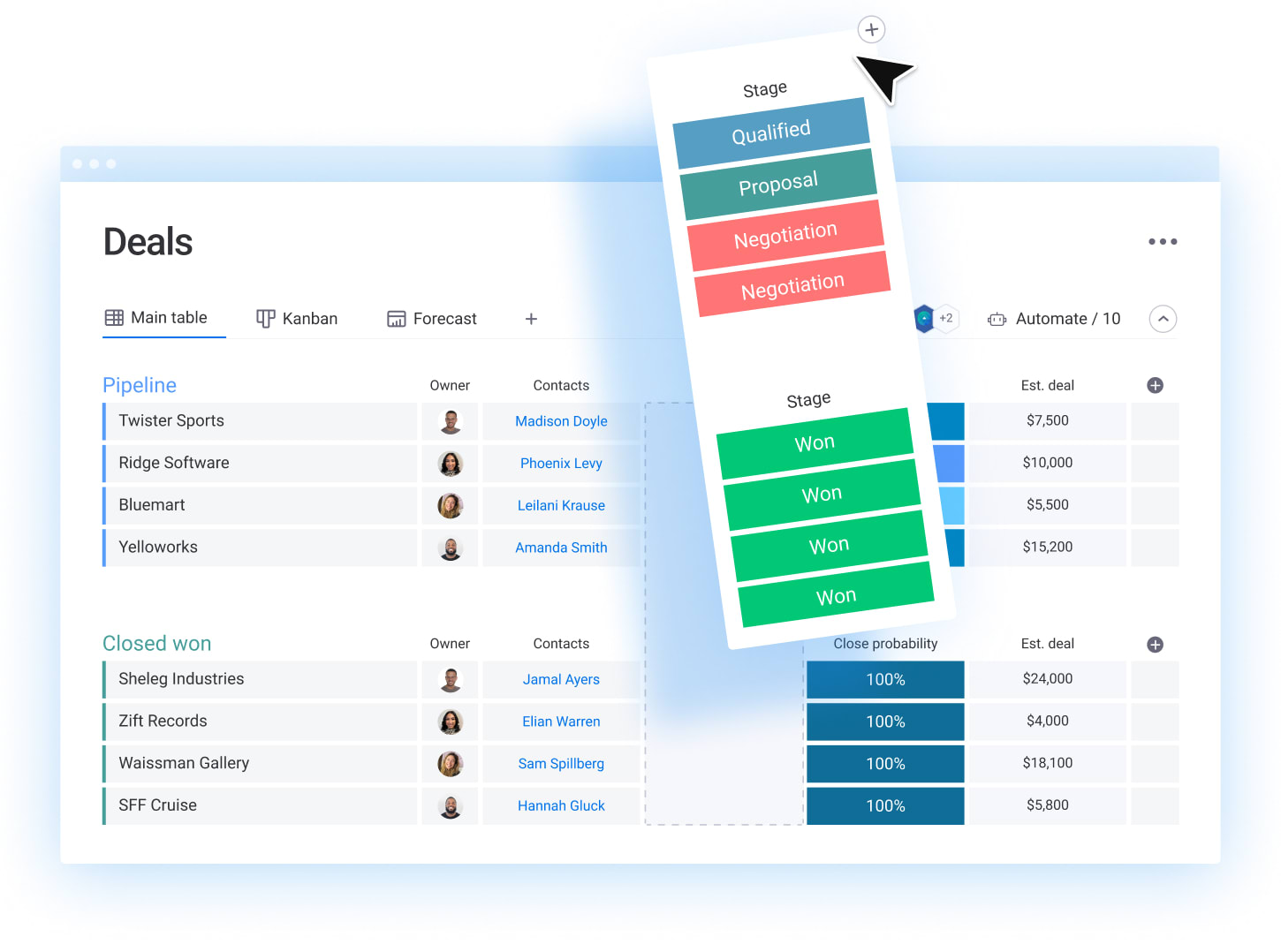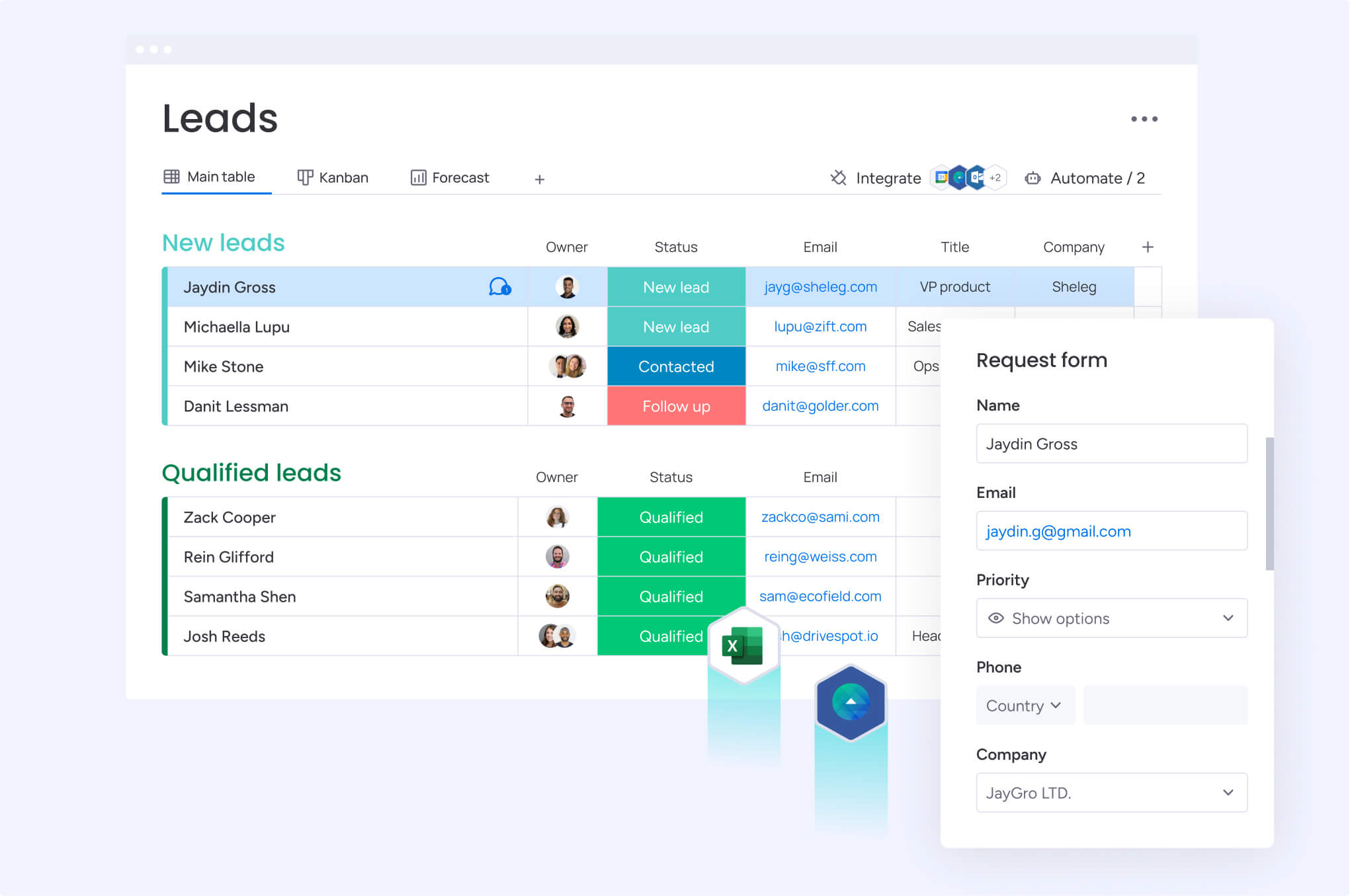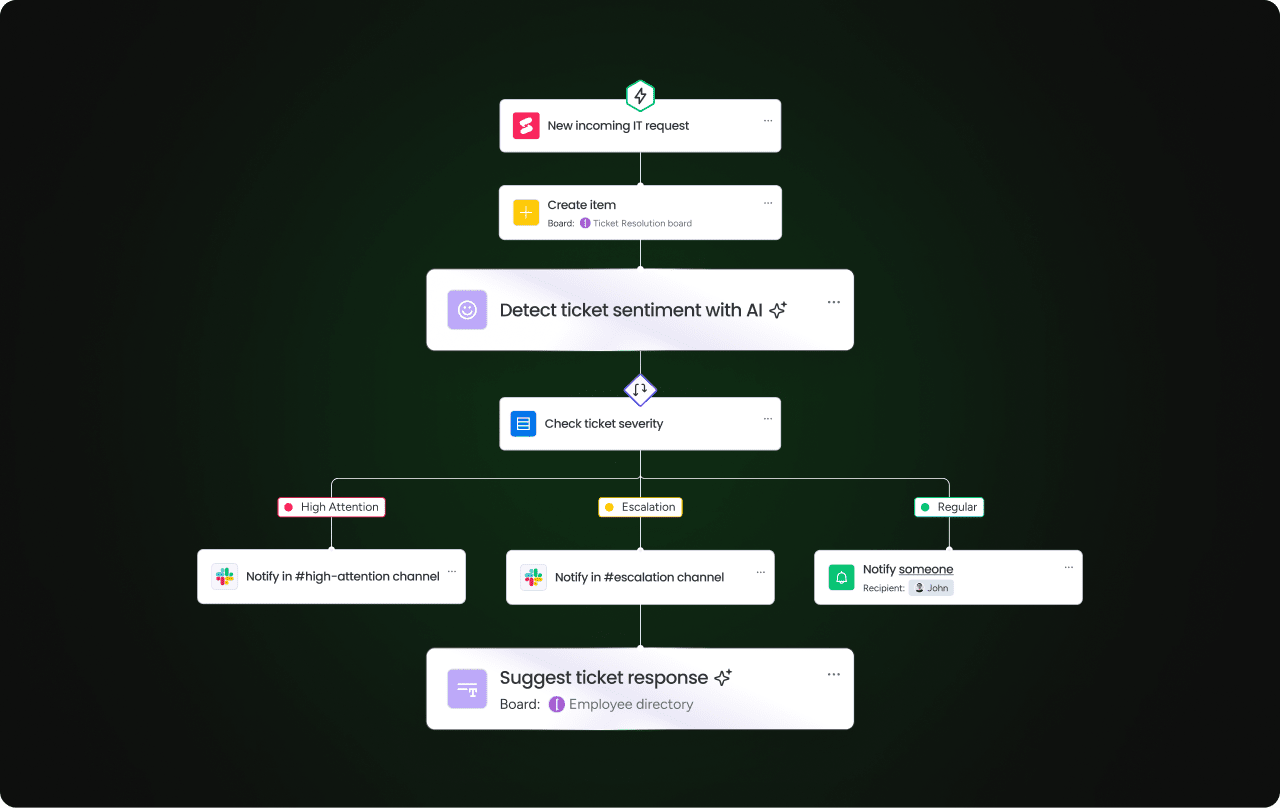Most sales teams face a hidden bottleneck that has nothing to do with their ability to sell. The real issue is the daily friction from manual data entry, repetitive follow-ups, and guesswork in prioritizing leads. This administrative weight slows down the entire sales cycle and keeps top performers from focusing on what they do best: building relationships and closing deals.
This is where AI sales enablement software creates a competitive advantage, turning administrative burdens into automated strengths. This guide walks through the practical applications of AI for sales teams. We will explore how to automate key tasks, from lead scoring to personalized outreach, and what to look for in an AI-powered platform.
Implementing these capabilities helps your team move faster, align on priorities, and make decisions with confidence. The first step is understanding what AI-powered enablement actually is and how it addresses the specific challenges your team faces every day.
Try monday CRMKey takeaways
- AI in sales enablement automates repetitive processes like data entry and lead scoring while providing data-driven insights that help your team spend more time actually selling instead of doing administrative work.
- The 7 key automation capabilities: lead prioritization, content generation, automated data entry, real-time coaching, smart forecasting, pipeline alerts, and streamlined follow-ups, transform daily sales activities from time drains into competitive advantages.
- monday CRM connects all your sales data in one place with native integrations and intelligent automation that starts working immediately without complex setup or months of training.
- Successful implementation requires starting with one specific problem, ensuring clean data quality, and gradually scaling while focusing on quick wins that build momentum across your team.
- The biggest pitfalls include resistance to change and over-relying on automation, but these are avoided by showing reps how AI makes them more valuable and using insights to enhance human relationships rather than replace them.
What is AI in sales enablement
AI in sales enablement is the use of artificial intelligence to automate repetitive sales tasks and provide data-driven insights. This means your sales team spends less time on manual work and more time actually selling.
Think of it as having a smart AI sales agent that handles data entry, scores leads, and even writes personalized emails. The AI learns from your sales patterns and gets smarter over time, making recommendations that help close more deals.
Traditional sales enablement relies on static playbooks and manual processes. AI-powered enablement adapts in real-time, analyzing customer behavior and suggesting the next best action for each unique situation.
Why AI and sales enablement matter together
You’re probably wondering why AI and sales enablement need each other. The answer is simple — sales teams are drowning in administrative work that keeps them from selling, yet they remain hesitant adopters compared to other departments, with monday.com’s World of Work report showing that only 51% of sales professionals use AI.
Your reps spend hours updating CRM records, researching prospects, and writing follow-up emails. Meanwhile, managers struggle to coach at scale and forecast accurately. AI solves these specific pain points by automating the grunt work and surfacing insights that drive revenue.
Here’s what AI brings to your sales enablement strategy:
- Predictable revenue: AI analyzes your pipeline and historical data to forecast with accuracy you can actually trust
- Time back in your reps’ day: Automation handles data entry, lead scoring, and follow-ups so reps focus on conversations
- Coaching that scales: AI identifies what top performers do differently and helps other reps replicate that success
- Decisions based on data, not gut feel: Real-time analytics show exactly where to focus your efforts
The real magic happens when AI learns your unique sales process. It identifies which activities lead to closed deals and helps your entire team follow that winning formula.

7 ways to automate tasks with AI for sales teams
These seven sales automation capabilities transform daily sales activities from time drains into competitive advantages. Each one addresses a specific challenge your team faces every day.
1. Lead prioritization and scoring
AI looks at every lead’s behavior — website visits, email opens, content downloads, and assigns a score based on buying signals. Your reps instantly know which prospects to call first.
The system learns what makes a good lead for your specific business. It might notice that prospects who view your pricing page three times are ready to buy, then automatically alerts reps when new leads show this pattern.
2. Content generation and personalization
Writing personalized emails takes forever. An AI email generator can produce custom messages based on each prospect’s industry, role, and previous interactions.
Your reps simply review and send, maintaining their personal touch while saving hours each week. monday CRM’s AI learns from your best-performing emails and applies those patterns to new messages.
3. Automated data entry
Nobody became a salesperson to do data entry. AI captures information from emails, calls, and meetings, then updates your CRM automatically.
Deal stages advance based on customer actions. Contact information syncs from email signatures. Meeting notes appear in the right records without anyone lifting a finger.
4. Real-time sales coaching
AI listens to sales calls and provides instant feedback. It identifies when reps miss opportunities or handle objections well.
After each call, reps see specific suggestions like “Next time, ask about their current solution earlier in the conversation.” This continuous coaching happens without managers reviewing every single call.
5. Smart forecasting
Forget spreadsheets and guesswork. AI analyzes your pipeline velocity, win rates, and historical patterns to predict revenue accurately.
The system alerts you when deals are at risk or when you’re trending below target. You’ll spot problems weeks before they impact your quarter.
6. Pipeline opportunity alerts
AI watches every deal in your sales pipeline and flags the ones that need attention. Maybe a prospect went silent after a demo, or a deal has been stuck in negotiation too long.
Your team receives specific action recommendations like “Schedule a check-in call” or “Involve a manager to help close.” No more deals dying from neglect.
7. Streamlined follow-ups
AI schedules follow-ups at the optimal time based on prospect engagement patterns. It drafts personalized messages and sends them automatically when prospects are most likely to respond.
Your sequences adapt based on prospect behavior. If someone clicks a link, they get different content than someone who didn’t engage.

Key components of an AI sales enablement platform
Choosing the right AI platform means understanding which features actually matter. You need capabilities that integrate with your existing workflow and deliver immediate value.
The best platforms combine essential features with advanced capabilities that grow with your team. Here’s what separates basic automation from true AI-powered enablement:
| Feature type | Essential features | Advanced capabilities |
|---|---|---|
| Data integration | CRM sync, email/calendar connection | Multi-system data unification |
| Automation | Lead scoring, task reminders | Predictive recommendations, intelligent routing |
| Analytics | Basic reports, dashboard views | Real-time insights, trend predictions |
| Coaching | Call recording, feedback prompts | Conversation intelligence, skill gap analysis |
| Personalization | Email templates, content library | AI-driven content generation |
AI sales enablement platform features
AI platforms offer specific capabilities that address your biggest sales challenges. These features work together to create a system that actually makes selling easier:
- Conversation intelligence: Analyzes calls to find what separates won deals from lost ones
- Predictive analytics: Shows which deals will close and which need intervention
- Automated workflows: Handles repetitive tasks based on triggers you define
- Personalized content generation: Creates custom proposals and emails at scale
- Opportunity alerts: Notifies you before deals go sideways
Integration with CRM and other systems
Your AI platform needs to work nicely with your existing tech stack. Look for native integrations with your email, calendar, and communication platforms.
monday CRM connects all your sales data in one place, making CRM with AI insights more accurate and actionable. When your AI can see the complete customer journey, it makes smarter recommendations.
The best platforms don’t require you to change how you work. They enhance your current process with intelligence and automation.
Try monday CRM
How to implement an AI-driven sales enablement strategy
Starting with AI doesn’t mean overhauling everything at once. Smart implementation follows a proven path that builds momentum through quick wins.
Step 1: Define goals and data requirements
Start by picking one specific problem to solve. Maybe it’s reducing data entry time or improving lead response rates. Clear goals help you measure success.
Check your data quality before turning on AI. Clean up duplicate records and fill in missing information. AI is only as good as the data you feed it.
Step 2: Choose an AI sales enablement platform
Look for platforms that match your team’s technical comfort level. If your reps struggle with complex software, choose something intuitive like monday CRM.
Test the platform with real scenarios from your sales process. Can it handle your unique workflows? Does it integrate with your must-have tools?
Step 3: Prepare data and reps
Clean your data and standardize how information gets entered. Create specific guidelines for data entry that everyone follows.
Run training sessions that show reps exactly how AI helps them sell more. Focus on time savings and commission potential rather than features.
Step 4: Track metrics and ROI
Monitor specific metrics that tie to your initial goals. Track time saved on admin tasks, improvement in response rates, or forecast accuracy.
Share wins early and often. When reps see colleagues closing more deals with AI help, adoption accelerates naturally.
Best practices for AI sales enablement tools and integration
Success with AI requires more than just turning on features. These proven practices help you maximize value while avoiding common mistakes.
Customize and scale gradually
Start with one team or one specific problem. Get it working perfectly before expanding. This approach lets you iron out issues without disrupting everyone.
Listen to user feedback and adjust workflows accordingly. Your reps know what slows them down — let them guide which automations to build first.
Ensure ongoing team training
Schedule monthly sessions to explore new AI capabilities. Show real examples of how colleagues use features successfully.
Create internal champions who help others and share tips. Peer learning drives adoption faster than top-down mandates.
Maintain data quality
Set up automated data validation rules that catch errors before they spread. Regular audits keep your AI insights accurate.
Make data hygiene part of your sales culture. When everyone understands that clean data equals more accurate AI recommendations, compliance improves.

Avoiding pitfalls when using AI in sales enablement
Even the best AI implementations hit snags. Knowing these challenges ahead of time helps you navigate around them.
Addressing resistance to change
Some reps worry AI will replace them, and this isn’t an isolated fear—research shows 30% of employees share this concern. Show how it actually makes them more valuable by handling boring tasks they hate anyway.
Start with volunteers who are excited about technology. Their success stories convince skeptics more effectively than any presentation.
Protecting data and privacy
Choose vendors with strong security certifications and clear data policies. Understand exactly how your customer data gets used and protected.
Create guidelines for what information AI can access. Balance automation benefits with privacy requirements.
Balancing AI with human interaction
AI handles the repetitive stuff, but relationships still require human touch. Use AI insights to have better conversations, not to replace them.
Train reps to position AI as a helper, not a replacement. Customers appreciate efficiency but still want to talk to real people about complex decisions.
Moving forward with AI sales enablement
AI sales enablement isn’t just another tech trend — it’s becoming essential for competitive sales teams. The organizations winning today use AI to eliminate friction from their sales process.
monday CRM brings these AI capabilities to life through practical features your team will actually adopt.
- Automated data capture that eliminates manual entry
- Intelligent lead scoring that prioritizes high-value prospects
- Personalized email generation that saves hours of writing time
- Real-time pipeline alerts that prevent deals from slipping away
No complex setup, no months of training, just intelligent automation that starts working immediately.
The question isn’t whether to adopt AI for sales. It’s how quickly you can implement these specific capabilities to eliminate administrative bottlenecks and accelerate your team’s success.
Try monday CRMFrequently asked questions
How do I measure ROI from AI sales enablement platforms?
Measuring ROI from AI sales enablement platforms involves tracking specific metrics like time saved on administrative tasks, improvement in conversion rates, and forecast accuracy. Calculate the hours saved per rep, multiply by their hourly rate, then add revenue gains from improved performance to determine total value against platform costs.
What happens if our customer data is incomplete or scattered across systems?
When customer data is incomplete or scattered, most AI sales enablement platforms include data consolidation features that pull information from multiple sources. Start by connecting your main systems, then use the platform's data cleaning tools to standardize formats and fill gaps through automated enrichment.
Can AI sales enablement integrate with our existing lead qualification process?
AI sales enablement platforms enhance your existing lead qualification process by learning your current criteria and automating the scoring. The AI observes which leads your team marks as qualified, identifies patterns, then applies those same standards automatically to new prospects.
Will AI sales enablement reduce the human element in our sales process?
AI sales enablement amplifies human capabilities rather than replacing them by handling administrative tasks so reps spend more time building relationships. Your team uses AI-generated insights to have more meaningful conversations and provide personalized solutions that strengthen customer connections.
What should we do if our sales team resists adopting AI sales enablement platforms?
When sales teams resist AI adoption, start with a pilot program using your most tech-friendly reps to demonstrate quick wins. Show specific examples of how AI saves time on tasks they dislike, then let successful early adopters share their experiences with the broader team.
How long does it take to see results from AI sales enablement implementation?
Most teams see initial results from AI sales enablement within 30 days, such as reduced data entry time and faster lead response. More significant improvements in conversion rates and forecast accuracy typically appear after 90 days as the AI learns your sales patterns and reps fully adopt the workflows.

